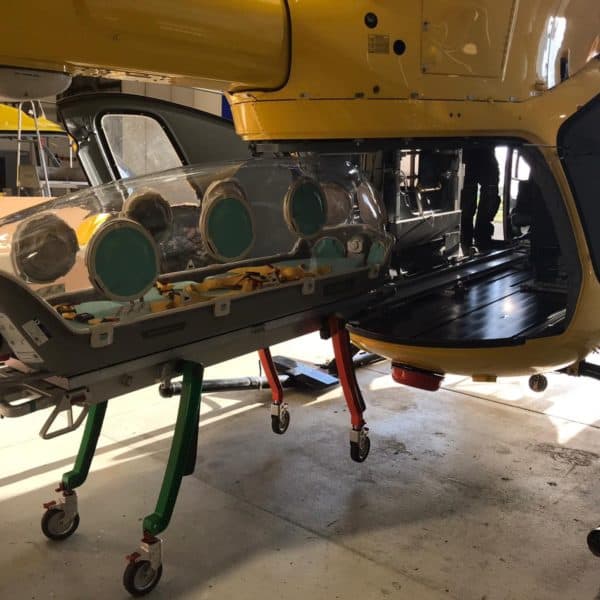28 Abr 2020
Babcock technology boosts UK air ambulance fight against Covid-19

Babcock emergency response teams on the front lines in Spain and Italy are helping UK air ambulances develop new ways of boosting safety and on-board patient care in the fight against COVID-19.
The UK’s network of air ambulances plays a critical emergency response role, bringing hospital-level treatment to patients and saving lives every day. Now Babcock, who operates a fleet of over 20 charity-funded air ambulances across Scotland, England, Ireland and Wales has unveiled new technologies to help UK air ambulance teams battling the virus.
By drawing on the experience and innovation of Babcock air ambulance experts in Spain, Italy and France, the company created a new framework system, allowing UK H145 air ambulances to fly with specialist patient isolation pods. The system allows isolation pods to work seamlessly with the on-board medical systems, giving emergency teams a new level of confidence and allowing first-class on-board patient care. Babcock teams working with similar systems in Italy, Spain, and France, have been sharing experience and knowledge gained during their own fight against the virus.
At the same time Babcock engineers across the UK and Spain have collaborated to design and develop a new on-board barrier which effectively separates the medical teams from the flight crews on all their international fleet of air ambulance helicopters. This critical new safety measure provides a new level of protection for teams on-board the lifesaving aircraft. The barrier was initially designed in Spain by Babcock specialists working with clinical experts. Now it has been customised by teams in Staverton, Gloucestershire, and following rapid prototyping by Babcock in Devonport the system is fully approved for use on EC135, H145 and AW109 air ambulance helicopters.
Babcock Engineering Project Manager, Steve Hughes, whose team has been working on the projects, said: “Projects like these would normally take several months but, using new guidance from the European Union Aviation Safety Agency (EASA) and the UK Civil Aviation Authority, we have accelerated this process to just a few weeks. It’s a fantastic achievement by everyone involved, being able to offer this capability will make a huge difference.
“We’ve been working with teams all over the world, throughout the industry to fast-track developments in the fight against COVID-19 and to keep our air ambulances flying. I’m really proud of what we’ve all achieved together. I think some of the lessons learnt here will change how we work forever.”
Across the world Helicopter Emergency Medical Services (HEMS) teams are working tirelessly to save lives and support national health services. Babcock teams in Italy, Spain, Portugal, France, the Nordics and the UK are witnessing the crisis first hand.
Working on the frontline, the HEMS team of over 750 aircrew and 210 deployed aircraft have been working day and night to keep flying in challenging circumstances. From the medical teams treating patients, the pilots and crews flying vital operations and the engineering and maintenance teams keeping air ambulances airworthy and available at all times, the team’s dedication to saving lives and protecting communities is evident through the vital operations they continue to deliver.
Neal Misell, Chief Executive of Babcock’s Aviation Sector, commented: “We are determined to keep flying to support our customers, providing frontline services and helping to save lives. We have found new and innovative ways of providing enhanced PPE for our pilots and medics, and segregation from patients through isolation pods and aircraft barriers.
“I am proud of our team who worked quickly with our customers and the relevant authorities to get these approved for use in our helicopters. Safety will always be at the heart of everything we do and we are proud of the role we play in the emergency response networks during this crisis in all the countries where we deliver HEMS.”